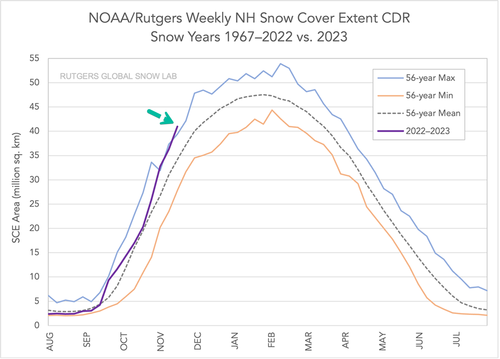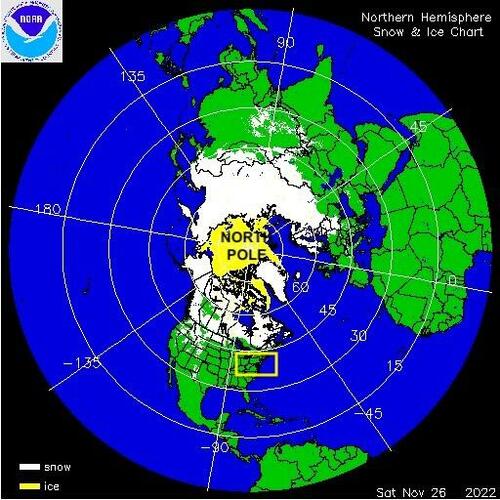A very different way of looking at the war in Ukraine, unlike what we read in the West. But where is the truth? Most probably in-between the rosy propaganda from the Ukraine government and this likewise rosy perspective from Russia. What is certain is that we are slowly trudging along a road to hell with no opportunity to turn back and a nuclear menace over the horizon. Will anyone responsible come to their sense before it's too late?
Authored by Dmitry Orlov,
Are you happy with the way the war in the former Ukraine is going? Most people aren’t - for one reason or another.
Some people hate the fact that there is a war there at all, while
others love it but hate the fact that it hasn’t been won yet, by one
side or the other. Bounteous quantities of both of these kinds of haters
are found on both sides of the new Iron Curtain that is hastily being
built across Eurasia between the collective West and the collective
East. This seems reasonable; after all, hating war is standard procedure
for most people (war is hell, don’t you know!) and by extension a small
war is better than a big one and a short war is better than a long one.
And also such reasoning is banal, trite, platitudinous, vapid,
predictable, unimaginative and… bromidic (according to the English
Thesaurus).

Seldom
is to be found a war-watcher who is happy with the progress and the
duration of the war. Luckily, Russian state television shows a very
significant one these almost daily. It is Russia’s president, Vladimir
Vladimirovich Putin. Having paid attention to him for over
twenty years now, I can confidently state that never has he been so
imbued with calm, self-assured serenity leavened with droll humor.
This is not the demeanor of someone who feels at any risk of losing a
war. The brass at the Ministry of Defense appear dour and glum on
camera—a demeanor befitting men who send other men to fight and possibly
to be wounded or to die; but off-camera they flash each other quick
Mona Lisa smiles. (Russian men don’t give stupid American-style
fish-eyed toothy grins, rarely show their teeth when smiling, and never
in the presence of wolves or bears).
Given that Putin’s approval
rating stands firm at around 80% (a number beyond reach of any Western
politician), it is reasonable to assume that he is just the visible tip
of a gigantic, 100-million-strong iceberg of Russians who calmly await
the successful conclusion of the special military operation to
demilitarize and denazify the former Ukrainian Soviet Socialist Republic
(so please don’t even call it a war). These 100 million Russians are
seldom heard from, and when they do make noise, it is to protest against
bureaucratic dawdling and foot-dragging or to raise private funds with
which to remedy a shortage of some specialty equipment requested by the
troops: night vision goggles, quadrocopters, optical sights, and all
sorts of fancy tactical gear.
A great deal more noise is
being made by the one or two percent whose entire business plan has been
wrecked by the sudden appearance of the New Iron Curtain. The
silliest of these thought that fleeing west, or south (to Turkey,
Kazakhstan or Georgia) would somehow magically fix their problem; it
hasn’t, and it won’t. The people we would expect to scream the loudest
are the LGBTQ+ activists, who thought that they were going to use
Western grant money to build East Sodom and East Gomorrah. They’ve been
hobbled and muzzled by new Russian laws that label them as foreign
agents and prohibit their sort of propaganda. In fact, the very term
LGBTQ+ is now illegal, and so, I suppose, they will have to use PPPPP+
instead (“P” is for “pídor”, which is the generic Russian term for any
sort of sexual pervert, degenerate or deviant). But I digress.
It
can be observed rather readily that those who are the least happy with
the course of the Russian campaign are also the least likely to be
Russian. Least happy of all are the good folks at the Center for
Informational and Political Operations of the Ukrainian Security Service
who are charged with creating and maintaining the Phantom of Ukrainian
Victory. These are followed by people in and around Washington, who are
quite infuriated by Russian dawdling and foot-dragging. They have also
been hard-pressed to show that the Ukrainians are winning while the
Russians are losing; to this end, they have portrayed every Russian
tactical repositioning or tactical withdrawal as a huge, humiliating
defeat personally for Putin and every relentless, suicidal Ukrainian
attack on Russian positions as a great heroic victory. But this PR
tactic has lost effectiveness over time and now the Ukraine has become a
toxic topic in the US that most American politicians would prefer to
forget about, or at least keep out of the news.
To be fair, the Russian tactical cat-and-mouse games in this conflict has been nothing short of infuriating.
The Russians spent some time rolling around Kiev to draw Ukrainian
troops away from the Donbass and prevent a Ukrainian attack on it; once
that was done, they withdrew. Great Ukrainian victory! They also spent
some time tooling around the Black Sea coastline near Odessa,
threatening a sea invasion, to draw off Ukrainian forces in that
direction, but never invaded. Another Ukrainian victory! The Russians
occupied a large chunk of Kharkov region that the Ukrainians left
largely undefended, then, when the Ukrainians finally paid attention to
it, partially withdrew behind a river to conserve resources. Yet another
Ukrainian victory! The Russians occupied/liberated the regional capital
of Kherson, evacuated all the people who wanted to be evacuated, then
withdrew to a defensible position behind a river. Victory again! With
all these Ukrainian victories, it is truly a wonder that the Russians
have managed to gain around 100km2 of the former Ukraine’s most valuable
real estate, over 6 million in population, secured a land route to
Crimea and opened up a vital canal that supplies irrigation water to it
and which the Ukrainians had blocked some years ago. That doesn’t seem
like s defeat at all; that looks like an excellent result from a single,
limited summer campaign.
Russia has achieved several of its
strategic objectives already; the rest can wait. How long should they
wait? To answer this question, we need to look outside the limited scope
of Russia’s special operation in the Ukraine. Russia has bigger fish to
fry, and frying fish takes time because eating undercooked fish can
give you nasty parasites such as tapeworm and liver fluke. And so, I
would like to invite you to Mother Russia’s secret kitchen, to see
what’s on the cutting board and to estimate how much thermal processing
will be required to turn it all into a safe and nutritious meal.
Mixing our food metaphors, allow me to introduce Goldilocks with her three bears and her porridge not to hot and not too cold.
What Russia seems to be doing is keeping their special military operation moving along at a steady pace - not to fast and not too slow.
Going too fast
would not allow enough time to cook the various fish; going too fast
would also increase the cost of the campaign in casualties and
resources.
Going too slow would give the Ukrainians and NATO time to regroup and rearm and prevent the proper thermal processing of the various fish.
In
an effort to find the optimal pace for the conflict, Russia initially
committed only a tenth of its professional active-duty soldiers, then
worked hard to minimize the casualty rate. It opted to start turning off
the lights all over the former Ukraine only after the Kiev regime tried
to blow up the Kerch Strait bridge that linked Crimea with the Russian
mainland. Finally, it called up just 1% of reservists to relieve the
pressure from the frontline troops and potentially prepare for the next
stage, which is a winter campaign—for which the Russians are famous.
With
this background information laid out, we can now enumerate and describe
the various ancillary objectives which Russia plans to achieve over the
course of this Goldilocks War.
The first and perhaps most important set of problems that Russia has to solve in the course of the Goldilocks War is internal.
The goal is to rearrange Russian society, economy and financial system so as to prepare it for a de-Westernized future.
Since the collapse of the USSR, various Western agents, such as the
National Endowment for Democracy, the US State Department, various
Soros-owned foundations and a wide assortment of Western grants and
exchange programs have made serious inroads into Russia. The overall
goal was to weaken and eventually dismember and destroy Russia, turning
it into a compliant servant of Western governments and transnational
corporations that would supply them with cheap labor and raw materials.
To help this process along, these Western organizations did whatever
they could to drive the Russian people toward eventual biological
extinction and replace them with a more docile and less adventurous
race.
Starting well over 30 years ago, Western NGOs set to corrupting the minds of Russia’s young.
No effort was spared to denigrate the value of Russian culture, to
falsify Russian history and to replace them both with Western pop
culture and propaganda narratives. These initiatives achieved limited
success, and the USSR, and Soviet-era culture, has remained ever-popular
even among those who were too young to have experienced life in the
USSR firsthand. Where the damage has been most severe is in education.
Excellent Soviet-era textbooks that taught students how to think
independently were destroyed and replaced with imports. These were at
best useful for training experts in narrowly defined fields who can
follow previously defined procedures and recipes but can’t explain how
these procedures and recipes were arrived at or to create new ones.
Russian teachers, who saw their job not just in educating but in
bringing up their students to be good Russians who love and cherish
their country, were replaced by Western-trained educationalists who saw
their mission as providing a competitive, market-based service in
bringing up qualified, competent… consumers! Who are these people? Well,
luckily, the Internet remembers everything, and there are plenty of
other jobs for these people such as shoveling snow and stoking furnaces.
But identifying and replacing them takes time, as does finding,
updating and reproducing the older, excellent textbooks.
But what of the young people left behind by this wave of destruction? Luckily, not all is lost. The
special military operation is providing them with some very valuable
lessons that their ignorant educationalists left out: that Russia—a
unique, miraculous agglomeration of many different nations, languages
and religions—has been preserved and expanded over the centuries through
the efforts of heroes whose names are not just remembered but
venerated. What’s more, some of them are alive today, fighting and
working in the Donbass. It is one thing to visit museums, read old books
and hear stories about the great deeds of one’s grandfathers and
great-grandfathers during the Great Patriotic War; it is quite another
to watch history unfold through the eyes of your own father or brother.
Give it another year or two, and Russia’s young people will learn to
look with disdain on the products of Russia’s Western-oriented
culture-mongers. Their elders do already: opinion polls show that a
large majority of Russians see Western cultural influence as a negative.
And
what of these Russian culture-mongers who have been worshiping all
things Western for as long as they can remember? Here, a most curious
thing happened. When the special military operation was first
announced, they spoke out against it and in favor of the Ukrainian
Nazis—a stupid thing to do, but they thought it good and proper to keep
their political opinions harmonized with those of their Western patrons
and idols so as to stay in their good graces. Some of them
protested against the war (ignoring the fact that it had been going on
for eight long years already). And then quite a few of them fled the
country in unseemly haste.
Keep in mind that these are neither
brain surgeons nor rocket scientists: these are people who prance around
on stage while making noises with their hands and mouths; or they are
people who sit there while makeup artists do things to their faces and
hair, then endlessly repeat lines written for them by someone else.
These are not people who have the capacity to analyze a tricky political
situation and make the right choice. In an earlier, saner age their
opinions would be steadfastly ignored, but such is the effect of the
Internet, social media and all the rest, that any hysterical nincompoop
can shoot a little video and millions of people, having nothing better
to do with their time, will watch it on their phones and make comments.
The
fact that these people are voluntarily cleansing the Russian media
space of their presence is a positive development, but it takes time.
If the special military operation were to end tomorrow, there is no
doubt that they would attempt to come back and pretend that none of this
ever happened. And then Russian popular culture would remain a
Western-styled cesspool full of vacuous personae who seek to glorify
every single deadly sin for the sake of personal notoriety and gain.
Russia has plenty of talented people eager to take their place—if only
they would keep out long enough for everyone to forget about them!
Particularly damaging to Russia’s future has been the emergence and preeminence of pro-Western economic and financial elites.
Ever since the haphazard and in many cases criminal privatization of
state resources in the 1990s, there was brought up an entire cohort of
powerful economic agents who does not have Russia’s interests in mind.
Instead, these are purely selfish economic actors who until quite
recently thought that their ill-gotten gains would allow them to enter
into posh Western society. These people usually have more than one
passport, they try to keep their families in some wealthy enclave
outside of Russia, they send their children to schools and universities
in the West, and their only use for Russia is as a territory they can
exploit in creating their wealth extraction schemes.
When in response to the start of Russia’s special military operation the West mounted a speculative attack on the ruble,
forcing Russia’s central bank to impose strict currency controls, these
members of the Russian elite were forced to start thinking about making
a momentous choice. They could stay in Russia, but then they would have
to cut their ties to the West; or they could move to the West and live
off their savings, but then they would be cut off from the source of
their wealth. Their choice was made easier by Western governments which
worked hard to confiscate the property of rich Russian nationals, freeze
their bank accounts and subject them to various other indignities and
inconveniences.
Still, it’s a hard choice for them to
make—realizing that, in spite of their sometimes fabulous wealth, for
the collective West they are just some Russians that can be robbed. Many
of them are mentally unprepared to throw in their lot with their own
people, whom they have been taught to despise and to exploit for
personal gain. A quick victory in Russia’s special military operation
would allow them to think that their troubles were temporary in nature.
Given enough time some of them will run away for good while others will
decide to stay and work for the common good in Russia.
Next in
line are various members of the Russian government who, having been
schooled in Western economics, are incapable of understanding the
economic transformation that is occurring in Russia, never mind helping
it along. Most of what passes for economic thought in the West is just
an elaborate smokescreen over this fundamental dictum: “The rich must be
allowed to get richer, the poor must be kept poor and the government
shouldn’t try to help them (much).” This worked while the West had
colonies to exploit, be it through good old-fashioned imperial conquest,
plunder and rapine, or through financial neocolonialism of Perkins’s
“economic hit men,” or, as has recently been grudgingly admitted by
several top EU officials, by taking advantage of cheap Russian energy.
That
doesn’t work any more—not in the West, not in Russia or any place else,
and mindsets have to adjust. There is a great deal of inertia in
appointments to government positions, where there are many vested
interests vying for power and influence. It takes time for such basic
ideas to percolate through the system as the fact that the US Federal
Reserve no longer has a planet-wide monopoly on printing money.
Therefore, it is no longer necessary for Russia’s central bank to have
dollars in reserve to cover their ruble emissions to defend it against
speculative attack since it is no longer necessary for Russia’s central
bank to allow foreign currency speculators to run rampant and stage
speculative attacks.
But some results have already been achieved, and they are nothing short of spectacular: over
the past few months, just a few well-chosen departures from Western
economic orthodoxy have made the ruble the world’s strongest currency,
have allowed Russia to earn more export revenue by exporting less oil,
gas and coal, and have allowed it to drive inflation down to almost
zero. Since the start of the special military operation, Russia has been
able to reduce its national debt by a large amount and increase
government revenues. A swift end to Russia’s special military operation
may spell the end of such miracles and a most unwelcome return to the
untenable status quo ante.
Beyond the intangible world of
finance, equally significant changes have been occurring throughout the
physical Russian economy. Previously, many economic sectors,
including car sales, construction and home improvement, software
development and many others, were foreign-owned and the profits from
these activities left the country. And then a decision was made to block
the expatriation of dividends. In response, foreign companies sold off
their Russian assets, taking a huge loss and depriving themselves of
access to the Russian market. The change has been quite stunning. For
example, at the beginning of 2022, Western car companies owned a large
share of the Russian auto market. Many of the cars that were sold had
been assembled within Russia at foreign-owned plants and the profits
from these sales were expatriated. Now, less than a year later, European
and American automakers are pretty much gone from Russia, replaced by a
swiftly reborn domestic auto industry. Chinese automakers have
immediately grabbed a large market share for themselves, while South
Korea continued to trade with Russia and has held on to its market
share.
Equally stunning have been changes in the aircraft industry. Previously,
Russian airlines were flying Airbuses and Boeings, most of them leased.
After the start of the special operation Western politicians demanded
that these leases be rescinded and the aircraft returned to their
owners, neglecting to take into account the fact that this would be
ruinous financially (glutting the market for used aircraft for years to
come and destroying demand for new aircraft) and, furthermore,
physically impossible, given that there was no way to effect the
transfer of the aircraft. In response, the Russian airlines nationalized
the aircraft registry, stopped flying to hostile destinations where
their aircraft might be arrested, and started making lease payments in
rubles to special accounts at the Russian central bank.
Then came
the news that Aeroflot is panning to buy over 300 new passenger jets,
all Russian МС-21s, SSJ-100s and Tu-214s, all before 2030, with the
first deliveries slated for 2023. There has been a scramble to replace
almost all Western-sourced components, such as composites for the carbon
fiber wing of the MC-21 and jet engines, avionics and much else for all
of the above. Over this period many of the previously leased Boeings
and Airbuses will be phased out, but these companies’ market share in
the largest country on Earth will be gone forever. Damage to Western
aircraft manufacturers will be matched by the damage to Western
airlines. At the outset of hostilities, the collective West closed its
airspace to Russia, and Russia reciprocated. The problem is that Europe
is small and easy to fly around while Russia is huge and flying around
it takes a whole day. European airlines suddenly found that theу can’t
compete on routes to Japan, China or Korea.
Following the closing
of the airspace came other sanctions, from both the European Union and
from the United States, all of them illegal, since the UN Security
Council is the only body empowered to impose sanctions. Right now the
European Union is working on the ninth packet of sanctions, all of which
have been dubbed “sanctions from hell”. Speaking of hell, Dante
Alighieri’s “Inferno” there are nine circles of hell, so perhaps the
sanctions juggernaut is about to run its course.
These
sanctions were supposed to have swiftly destroyed the Russian economy
and have caused so much social upheaval and suffering that the people
would gather on Red Square and overthrow the dread dictator Putin (or so
thought Western foreign policy experts). Clearly, nothing of the sort
has happened and Putin’s approval rating is as high as ever. On
the other hand, the good people of the European Union are indeed
starting to suffer. They can no longer afford to heat their homes or to
take regular hot showers, food has become outrageously expensive for
them, and so much else is going wrong that huge crowds of protestors
have been gathering all across Europe and demanding, among other things,
an end to anti-Russian sanctions, normalization of relations with
Russia and a return to business as usual. Their demands are unlikely to
be met, since this would mean a major loss of face for the European
leaders.
But there is a more important reason why the
sanctions will stay: a return to business as usual would mean that
Russia would once again provide energy and raw materials to Europe
cheaply while allowing European companies to profit from the labor of
Russians. This is quite unappealing and is therefore unlikely
to happen. Russia is using the sanctions as an opportunity to rebuild
its domestic industry and reorient its trade away from hostile nations
and toward friendly nations that are fair and sympathetic in their
dealings with Russia. It is also working hard to phase out the use of
currencies that Dmitry Medvedev called “toxic”; namely, the US dollar
and the euro.
Add to this list a wonderful new Russian innovation
called “parallel import.” If some company, in complying with
anti-Russian sanctions, refuses to sell its products to Russia or to
service or upgrade its products in Russia, then Russia will buy these
products and upgrades from a third or fourth or fifth party without
permission from the US, the EU or the manufacturer. If a certain
brand-name product becomes unavailable, the Russians simply rename the
brand and make the same product themselves, or have the Chinese or
another trade partner do it for them. And if the West refuses to license
its intellectual property to Russia, then that intellectual property
becomes free in Russia.
This works particularly well with
software: free copies of brand-name software are just as good as the
paid-for copies, and if tech support, training or other associated
services become unavailable from the West, the Russians simply organize
their own. Intellectual property of various sorts makes up a large
portion Western notional wealth, and Western sanctions are having the
effect of letting Russia make use of it free of charge. Thanks to modern
digital technology, it works rather well with hardware too. Instead of
painstakingly reverse-engineering products, now the same effect can be
achieved by buying the 3D models on a thumb drive and 3D-printing them
or automatically generating the mill and drill paths to create them on
an NC mill. Putin likes to use the expression “tsap-tsarap” to describe
this process. It is hard to translate directly but pertains to the act
of a cat snatching its prey with its claws. The short of it is, what
Russia previously had to pay for is now, thanks to sanctions, free to
it.
Since the Goldilocks War is, after all, a sort of war, we need to briefly discuss its military aspects.
Here, too, a steady-as-she-goes approach seems to be the most
copacetic. The stated goal is to demilitarize and denazify the former
Ukraine, and to some extent this has already been achieved: most of the
armor and artillery that the Ukraine had inherited from the USSR has
already been destroyed; most of the diehard Nazi battalions are either
dead or a shadow of their former selves. Gone too are most of the
volunteers that once fought on the Ukrainian side. After over 100000
Ukrainian soldiers “have been killed” since February 2022 (as
forthrightly stated, then sheepishly denied, by European Commission
President Ursula von der Leyen), and after perhaps as many as half a
million casualties, scores of service-age men bribing their way out of
the country and several rounds of the draft, it is slim pickings. With
well over a hundred Ukrainian casualties a day the pickings are bound to
get even slimmer over time. Foreign mercenaries have been used to fill
the gap—Anglos, Poles, Romanians—but there is a major problem with them:
as Julius Caesar pointed out, lots of people are willing to kill for
money but nobody wants to die for money—except an idiot, I would add.
And on NATO’s Russian front an idiot and his life are soon parted.
Up-to-date information on Russian casualties is a state secret and the
only number divulged by Defense Minister Sergei Shoigu in late September
2022 was 5937 killed since the start of the campaign. Casualty rates
are said to have been significantly lower since then.
At
present, there is still no shortage of idiots on the Ukrainian
side—yet—and neither is there a shortage of donated Western weaponry.
First came used Soviet-era tanks and other weapons systems donated from
all over Eastern Europe; then came actual Western weapons systems. And
now throughout NATO one hears plaintive cries that they have nothing
left that they can give to the Ukrainians: the cupboard is empty. Nor
can they manufacture more weapons in a hurry. To start churning out
weapons at the same rate as Russia is doing, these NATO members would
first need to reindustrialize, and there are neither the human
resources, nor the money to do so. And so the Russian army grinds away,
demilitarizing the Ukraine, and the rest of NATO with it. In the
process, it is perfecting the art of fighting a land war against
NATO—not that a single NATO country would even entertain such an idea.
Perhaps this is mission creep, or perhaps this has been the plan all along, but what Russia is doing at this point is destroying NATO.
You may recall that a year ago Russia demanded that the US honor
certain security guarantees it made as a condition for allowing the
peaceful reunification of Germany; namely, that NATO would not expand
eastward. “Not an inch to the east” was how the official record of the
meeting reads. Gorbachev and Shevardnadze failed to get this deal on
paper and signed, but a verbal deal is a deal. A year ago Russia’s offer
was quite moderate: that NATO withdraw to its pre-1997 borders, when it
expanded to Eastern Europe.
But, as usually happens when
negotiating with the Russians, their initial offer is usually the best.
For all we know, based on how things are going in the Ukraine, Russia’s
best and final offer may require NATO to disband altogether. After all,
the Warsaw Pact disbanded 31 years ago but NATO is still around and
bigger than ever; what for? To fight Russia? Well, then, what are they
waiting for? Come and get it! This may not even take the form of a
negotiation. For example, Russia could say, take a quick whack at Latvia
(it richly deserves a whack or two for abusing its large native Russian
population Nazi-style) and then stand back and say, “Come on, NATO,
come and die heroically on our doorstep for poor little Latvia!” At
this, NATO officials will stand united but very quiet, thoughtfully
examining their own and each others’ shoes. Once it becomes clear that
there will be no offers to launch World War III to avenge Latvia, NATO
will quietly dry up and blow away.
Finally, we come to what is perhaps the least important reason for the Goldilocks War: the former Ukraine itself.
In view of Russia’s other strategic goals, it seems more of the nature
of a sacrificial piece in a chess gambit. Given what Russia has already
achieved over the past nine months—four new Russian regions, six million
new Russian citizens, a land bridge to Crimea, irrigation water supply
to Crimea—there isn’t much left for Russia to achieve militarily before
its military campaign reaches the stage of diminishing returns. The
addition of Nikolaev and Odessa regions and full control of the Black
Sea coastline would, of course, be most valuable; control of Kharkov and
Kiev somewhat less so. Control of the entire Dniepr hydroelectric
cascade is a definite nice-to-have. As for the rest, it could be left to
languish for ages as a deindustrialized, depopulated wasteland, labeled
“Mostly harmless.”
Let me divulge a personal detail or two. Two
of my grandparents were from Zhitomir, my father was born in Kiev, my
first romantic interest was a girl from Odessa, and over the years I’ve
had as many friends from Odessa, Kharkov, Lvov, Kiev, Donetsk, Vinnitsa
and elsewhere as anywhere else in Russia. Russia? You read that right:
there is no way to convince me that so-called “Ukrainian territory”
somehow isn’t Russia or that the people who live there somehow aren’t
Russian—regardless of what some of them have been recently brainwashed
to think. What’s more, none of these people I have known over the years
ever thought of themselves as the least bit Ukrainian and they would
probably view the very idea of a Ukrainian nationalist identity as
symptomatic of a mental condition. The label “Ukrainian” was to them
some Bolshevik nonse; since then, Ukrainianness has been turned into a
Western method for exploiting minor ethnic variations in order to make
one group of Russians fight another group of Russians.
In case you
are doubtful, let’s apply the good old duck test: Do the people there
walk, quack and look like Russians? All of that territory, with one
minor exception in the far west, was part of Russia for anywhere between
ten and three centuries; most of the people there, and virtually the
entire urban population, speaks Russian as their native language; their
religion is predominantly Russian Orthodox; they are genetically
indistinguishable from the rest of the Russian population. So, what
happened to them?
Unfortunately, a small piece of this Russian
land spent three centuries in captivity to the Austro-Hungarian Empire
or as part of Greater Poland, and this poisoned their minds with foreign
ideas such as Catholicism and ethnic nationalism. Unlike Russia, which
is a multinational, multi-ethnic, religiously diverse monolith, the West
is a mosaic of ethnic nationalisms, and where there are nationalists
there may be Nazis, ethnic cleansing and genocide.
As one
drop of poison infects the whole tun of wine, these Western Ukrainians,
with lots of help and funds from the German Nazis, then the Americans
and the Canadians, managed to infect a large part of the formerly
Ukrainian territory with a fake nationalism based on a forged history
and a haphazardly concocted culture. Official bans on the
teaching and, eventually, the use of Russian have brought up a
generation of young people who are essentially illiterate in their
native Russian. They are taught in Ukrainian, but Ukrainian literacy is
close to an oxymoron, since nothing of any great consequence has ever
been written or published in that language and the vast majority of
Ukrainian literary works are, you guessed it, in Russian.
The
Russian special military operation that’s been ongoing since February
2022 has polarized the entire population. Those who had decided to be
with Russia back in 2014 were, obviously, overjoyed to finally get some
help from Russia. The now Russian regions of Donetsk, Lugansk,
Zaporozhye and Kherson gladly voted to join Russia. But as far as the
rest of the former Ukrainian territory, the polarization is mostly in
the opposite direction. Those who wanted to be with Russia mostly voted
with their feet and are now living somewhere in Russia.
This is something that time alone can fix. Eventually
the population of the former Ukraine will be forced to make a choice:
they can be Russian, or they can be refugees somewhere in Europe, or
they can die fighting Russians at the front. Note that even
Donetsk and Lugansk didn’t make this choice right away, the way Crimea
did. At that time, only some 70% of their population was in favor of
leaving the Ukraine and rejoining Russia. It took eight years of
relentless Ukrainian bombing to convince them to make this choice.
Over
these intervening years, the diehard “Ukrainians” filtered out, leaving
behind a population that was close to 100% pro-Russian. It was only
then that the Kremlin granted them official recognition, sent in troops
to defend them from imminent invasion and, soon after, accepted them
into the Russian Federation. And now the same sort of sorting operation
has to take place throughout the rest of the former Ukraine. How
long will it take? Only time will tell, but it is already clear that,
as far as Russia is concerned, there is no compelling reason to rush.










